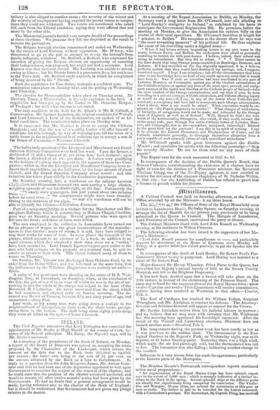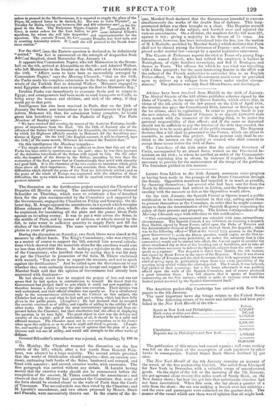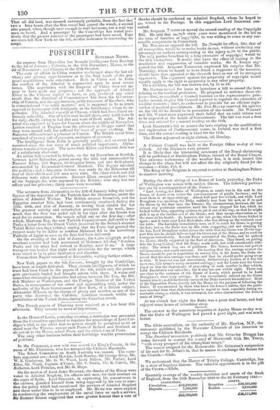Allistrliantous.
A Cabinet Council was held on Saturday afternoon, at the Foreign, Office, attended by all the Ministers : it sat three hours.
The 3,iinit!...srs an,-; the Officers of State of the Royal Household were invited to Lansdowne Houk, Berkeley Square, on Saturday evening, id' arrange the list of Sheriffs for tai present year, previously to its being submitted to the Queen in Council. The Marquis of Lansdowne, Lord President of the Council, entertained the party at dinner.
The Cabinet Ministers dined with Lord John Russell on Wednesday' evening, at his residence in Wilton Crescent.
The following circular has been issued to the supporters of her Ain jesty's Ministers- " Lord John Russell presents his compliments to —, andparticularly requests his attendance at the House of Commons ever: Monday and Friday, at a quarter before four o'clock precisely, to put the Speaker into the chair."
In consequence of the death of Lord Henley, Sir Robert Peel's Par- liamentary dinner to-day is postponed. Lord Henley was married to a sister of Sir Robert Peel.
Major-General Sir Henry Wheatley, Privy Parse to the Queen, has forwarded her Majesty's annual bounty of 100/. to the Sussex County ' Hospital, and 201. to the Brighton Dispensary.
It has now been decided upon that a brevet will take place on the 10th instant, in honour of the christening of the Princess Royal. The same day is fixed for the augmentation of the Royal Marine force ; when twelve Captains and twelve First-Lieutenants will receive commissions,, notices having been received at Woolwich to that effect.—Courier,, Feb. 5.
The Earl of Cardigan has retained Sir William Follett, Sergeant Wrangham, and Mr. Adolphus, to conduct his defence. The Attorney- General and Solicitor-General will appear as counsel for the Crown.
Mr. Justice Littledale retires from his judicial labours to-morrow ; and we believe that we may state with certainty that Mr. Wightman has this morning been appointed his Lordship's successor. After the result of the Walsall and Canterbury elections, Ministers dare not hazard another seat.—Standard, Feb. 5.
The temperature during the present week has been nearly as low as it was previous to the sudden thaw. The thermometer in the Zoo- logical Gardens in the Regent's Park, on Wednesday night, was at 11 degrees, or 21 below freezing-point. Yesterday there was a high wind, which made the air feel piercingly cold, but the thermometer was not so low. The barometer was also falling ; indicating another change in the weather.
Influenza in a very severe form has made its appearance, particularly at the Eastern parts of the Metropolis.
The Brighton Gazette's Portsmouth correspondent reports continued active naval preparations-
" An augmentation of the Royal Marine Corps has been ordered, report says to the extent of 3,000 men ; which is strongly indicative of a further in- crease to the Navy in the spring. Several splendid ships at the different ports are silently but expeditiously being completed for commission. The Vindic- tive and Warspite, 50-gun ships, are ordered for commission at this port as soon as ready. The former is said to be intended for the Lisbon command, with a Commodore's pendant. The Inconstant, 36, Captain Pring, has received: orders to proceed to the Mediterranean, it is reported to supply the place of the Pique, 36, ordered home to be docked, &c. She was to leave Plymour" on Tuesday for Malta, taking out between 300 and 400 volunteer sea,- en for dis- posal in the fleet. The Endymion frigate, Captain the r. onourable F. W. Grey, is under orders for the East Indies, to join. 7year-Admiral Elliott's squadron, for whom she will take despatches and supernumeraries for the squadron. The corvette Tweed, 20, Co'm„der Douglas, has bent sails, and is awaiting Admiralty orders. It ;; said she will proceed to the South Ame- rican station."
For the third, 'Lime, the Eastern question is declared to be definitively "settled." The fact is announced on the strength of despatches from AdreLral Stopford, dated Marmorice Bay, January 14.
It appears that Commodore Napier, who left Marmorice in the Strom- boli on the 6th, arrived at Alexandria on the 8th; and Admiral Walker, who left Marmorice in the Iscudar on the 8th, arrived at Alexandria on the 10th. " Affairs seem to have been so successfully arranged by Commodore Napier," says the Morning Chronicle, " that on the 11th, the Pasha made his complete submission to the Sultan, and gave up the whole of the Turkish fleet to Admiral Walker. Mehemet engaged to send Egyptian officers and men to navigate the fleet to Marmorice Bay."
Ibrahim Pasha was immediately to evacuate Syria and to return to Egypt ; and arrangements had been made to send transports to Caiffa, to bring away the women and children, and sick of the army, if they could get to that port.
Intelligence has also been received in Paris, that on the 12th of January the Sultan sent instructions to his Commissioners in Egypt to inform Mehemet Ali, that, his submission being complete, he would grant him hereditary tenure of the Pashalie of Egypt. Tne Paris Moniteur of Sunday says- " We have received this evening, by means of the Austrian Embassy, intelli- gence of importance from the East. 'On the 12th of January one of the officers of the Sultan left Constantinople for Alexandria, the bearer of a firman, by which his Highness officially accords to Mehemet Ali the hereditary pos- session of Egypt. On the 14th [the English account, it will be observed, says the 11th) of the same month, Mehemet Ali restored the Turkish fleet.' " On this intelligence the Moniteur remarks- " The simple mention of the dates is sufficient to show that this act of the Pasha has been entirely spontaneous on his part ; since 'he was then ignorant of the definitive intentions of the Sultan with regard to him. On the other side, the despatch of the firman by the Sultan, preceding by two days the restoration of the fleet, proves that at Constantinople they acted with sincerity and good faith. It is the character of the two events we announce which gives them above all their importance. We can conclude from them, that all the difficulties which disturb the peace of the East are definitively settled ; and as the peace of the whole of Europe was connected with the solution of these difficulties, the news which has arrived will be received everywhere with the greatest interest."
The discussion on the fortification project occupied the Chamber of Deputies till Monday evening. The amendment proposed by General Schneider on Thursday, which went to substitute a line of detached forts for the plan recommended by the Committee and supported by the Government, engaged the Chamber on Friday and Saturday. On the latter day, M. Arago opposed the amendment, in a speech which occupies fifteen columns of the Moniteur. He also recommended a plan, which he explained, for inundating all the plain and the passes about Paris -against an invading enemy. It was to put a weir across the Seine, in the middle of Paris, and by means of turbines, or wheels moved by the &all, to raise water in sufficient quantity to supply Paris and fill the 'ditches of the fortifications. The same system would irrigate the arid plains in years of peace.
During the discussion on Saturday, two fresh blows were aimed at the measure by official hands. The King's Commissary, who was expected as a matter of course to support the bill, entered into several calcula- tions which showed that the materials alone for the erections would cost no less than 43,000,000 francs. In making a rejoinder to the remarks of the Commissary, who justified them by saying that it was his duty to put the Chamber in possession of the facts, M. Thiers exclaimed with warmth, "You are here to support the measure, and not to speak :against the fortifications." And he called upon the Government to say :whether they were seriously determined to accept and support the bill ? Marshal Soult said that the opinion of Government had already been expressed with frankness— He had already stated that he accepted the project of law, and was not aware that he had spoken in contradiction to himself. He found that the Government had pledged itself to acts which it could not now repudiate ; it -therefore became a duty to carry the plan into execution. Their opinion was well understood, and their official situation was equally so. For a satisfactory reply to the remonstrances addressed to the Cabinet on this subject, the .-Chamber Lad only to read what he had said and written, which had been fully given in the publicyrints. (Laughter.) He had declared that he accepted the enceinte continues as of utility, and capable of adding to the solidity of the other works. On this subject the most contradictory opinions had been ex- pressed before the Chamber; but their elucidation had the effect of displaying the question in its true light. The great object in view was the defence and security of the capital ; and if undertaken at all, it should be in a solid and -efficient manner. The Chamber must not be over-scrupulous as to his former ideas upon this subject, or as to what lie might still think in private. (Laugh- ter, and marks of surprise.) He was now of opinion that the plan of a con- thmous wall was one of utility, and would add strength to the other works of :defence.
General SchneitisseS amendment was rejected, on Saturday, by 236 to .175.
On Monday, the Chamber resumed the discussion on the first -article of 'the bill; which, after a few words from General Paix- bans, was adopted by a large majority. The second article provided that the works of fortification should comprise—first, an enceinte con- Wrath, embracing both banks of the Seine, bastioned and scarped, and lined with masonry ; and second, exterior works, with casemates. The first paragraph was carried without any debate. M. Larabit having moved that the exterior works should not be commenced before the completion of the enceinte, M. Thiers combated the amendment ; and observed that the Ministry had promised the Committee that none of the forts should be erected closer to the walls of Paris than the Castle of Vincennes. The second article was then voted by the Chamber ; and
Larabit'S amendment, and two others proposed by Messrs. Denis and Pascalis, were successively thrown out. In the Course of the de- Date, Marshal Soult declared that the Government intended to execute simultaneously the works of the double line of defence. This long- protracted debate was then brought to a close. The Deputies seemed to be heartily tired of the subject, and hurried over and rejected the various amendments. On a division, the numbers for the bill were 237, against it 162 ; giving a majority in its favour of 75 votes. An amendment, however, has been introduced into the law, (ou the motion of M. L'Herbelle, modified by Marshal Soult,) which declares that Paris shall not be classed among the fortresses of France—nor, of course, be placed under martial law—except by a special legislative enactment.
The Gazette de Tribunaur reports the trial at Tours of a young Eng- lishman, named Alcock, who had robbed his employer, a banker at Nottingham, of eight hundred sovereigns, and fled to Boulogne, and thence to Tours. The offence for which he was tried was travelling with a false passport ; but the most interesting feature in the affair was the refusal of the French authorities to surrender him to an English Police-officer, " as the English Government could never be prevailed upon to deliver up a refugee from France under similar circum- stances." The prisoner was only fined fifteen francs, and discharged.
Advices have been received from Madrid to the 26th of January-. The Madrid Gazette of the 22d ultimo publishes a decree signed by the Duke of Victoria, in the name of Queen Isabella, which orders that, in virtue of the 5th article of the law passed on the 17th of April 1838, the interest due upon the Consolidated Debt, internal or foreign, up to the 1st ultimo, shall be capitalized. In order to procure funds to pay the new interest, the Minister of Finance is to deposit 2,000,000 seals every month with the treasurer of the sinking-fund, to be under the personal responsibility of that officer ; and if the sums so deposited should not be sufficient to pay the interest of the debt thus created, the deficiency is to be made good out of the public treasury. The Regency declares that a bill shall be presented to the Cortes, which are about to assemble, to authorize this project. Those persons only shall be en- titled to the interest on the capital so created who shall consent to accept those terms before the 30th of June.
The Castellano of the 25th states that the military Governor of Cadiz, accompanied by an armed force, waited on the Provincial In- tendant on the 16th ; to whom he notified an order of the Commander- General enjoining him to obtain, by violence if required, the funds necessary to provide for the maintenance of the troops of the garrison. The Intendant yielded to this menace.
Letters from Lisbon to the 25th January announce some progress as having been made in the passage of the Douro Convention through the Senate. Opposition members had impeded it as much as possible, by absenting themselves ; but several who had been sent for from the North by Government had arrived in Lisbon, and the Senate was pro- ceeding with the measure as fast as the Opposition would allow.
On the 16th January, the Spanish Consul at Oporto issued a public notification to his countrymen resident in that city, calling upon them to present themselves at the Consulate, in order that he might commu- nicate to them the determination of the Spanish Regency respecting the safety of their persons and property. The Lisbon correspondent of the Morning Chronicle says with reference to this notification- " This extraordinary announcement was attended with some extraordinary circumstances. The Spanish Consul, I am informed, on receiving a despatch from Madrid, signed by Senor Ferrer, called upon the Dake of Terceira and the Administrator-General of Oporto, and showed them the despatch; .which was to the following effect—' That as the :Trend tcmi allowed to the Portu- guese Goveromnt t5 Settle the Douro question would expire on the 31st in- stant, and there being every probability, or rather the certainty that it (the convention) would not be carried into effect, the Consul ought to consider the above-mentioned day as that of the breaking out of hostilities, and to take all the precautions necessary to deliver the Spanish subjects from the evils conse- quent on a rupture.' The despatch is dated from Madrid, the 8th instant, and signed by Senor Ferrer in the name of the Regency. When it was shown to the Duke of Terceira and the civil Governor, they both represented the mis- chief of acting upon it, particularly when there was every probability of the question being settled within the allotted period. The Consul, it was believed, had yielded to their reasoning; but a few hours afterwards it was publicly affixed upon the walls of the Spanish Consulate, and of course produced a great sensation there. You will observe that it speaks of hostilities commencing on the 31st instant ; which is quite at variance even with the limited period accorded by the Spanish Government itself."
The American packet-ship Cambridge has arrived with New York papers to the 9th January. The most important news she brings relates to the United States Bank. The following return of its assets and liabilities had been put-
fished in the New York Herald of the 8th—
Dollars.
Specie at New York and Philadelphia.... ............ 1,725,067 Bank-notes at ditto and ditto 707,441 Foreign bills and balances 1,135,953
3,568,481 Circulation 9,336,000 Deposits due in Philadelphia and New York 1869,022 11,205,022
The publication of this return had caused a panic ; and some anxiety was felt on the subject of the resumption of cash payments by other banks in consequence. United States Bank Shares declined 21- per cent.
The New York Herald of the 8th January contains art adcantit the wreck of the fine packet-ship Garrick. She sailed from Liverpool for New York in December, with a valuable cargo of manufactured goods. On the night of the 6th or the morning of the 7th January, she got aground about twenty-five miles south of Sandy Hook, on the New Jersey shore ; but how she got into that unfortunate situation had not been ascertained. When first seen, she lay about a quarter of a mile from the shore : the sea was making a breach over her midships ; and the crew and passengers were collected on the quarter-deck. The master of the vessel which saw them was of opinion that all might land.
That all did land, was deemed extremely probable, from the fact tine: two o hree hours after the first vessel had passed the wreck, a second also passed, when, though near enough to read her name, not a soul was seen on board. And a passenger by the Cambridge has stated posi- tively that the greater number of the passengers had been saved. Four steamers left New York on the 8th, to offer assistance in recovering the cargo.




























 Previous page
Previous page